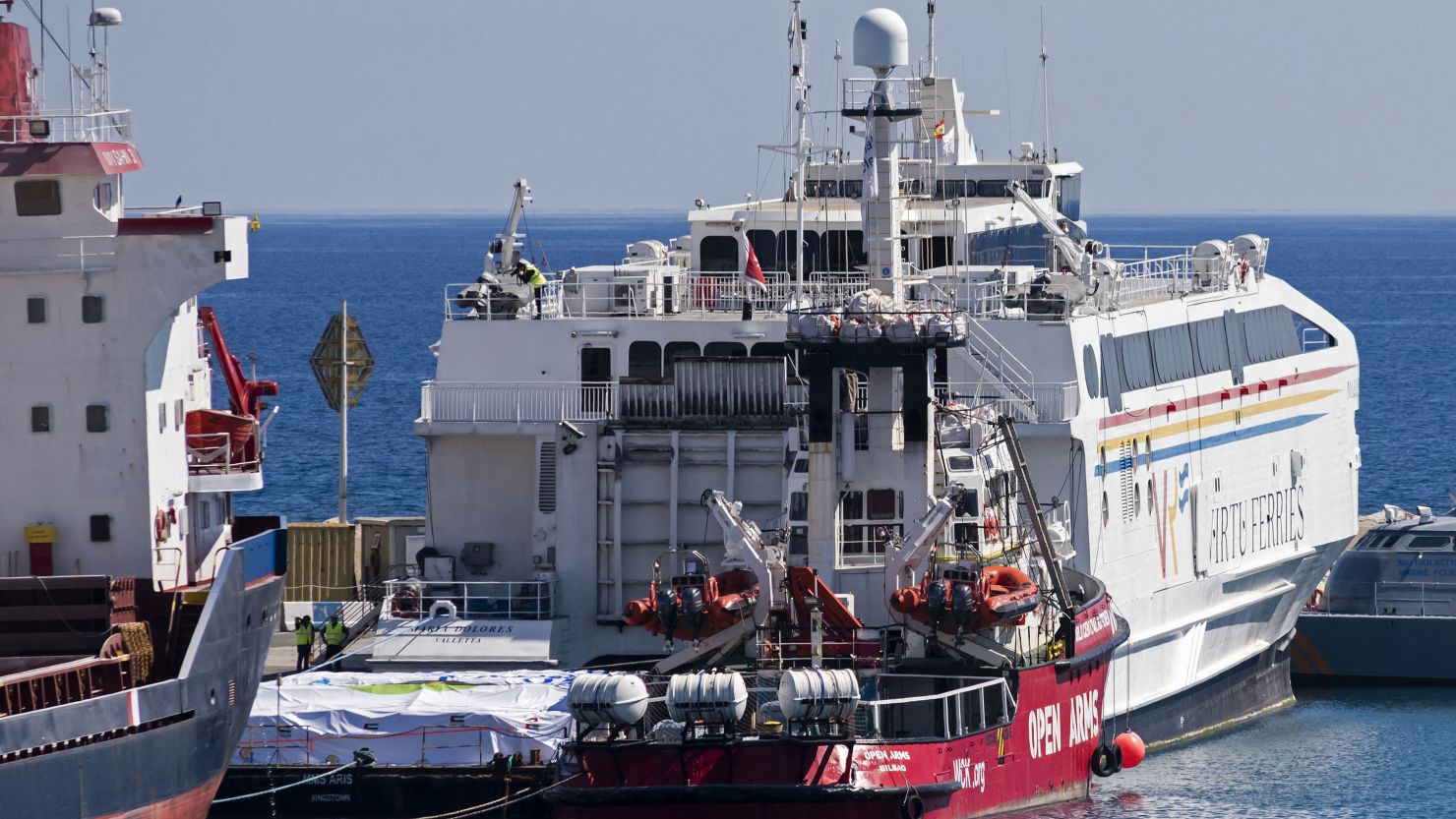A ship carrying humanitarian aid to Gaza has departed the port city of Larnaca in Cyprus, according to World Central Kitchen, a non-profit which said it is the first maritime shipment of aid to the war-torn strip.
The ship will take about 60 hours to reach Gaza from Cyprus, a source familiar with the matter told CNN. It left around 3:00 a.m. ET on Tuesday.
“After weeks of preparation, our team in Cyprus loaded almost 200 tons of food onto the Open Arms boat that will deliver the desperately-needed aid,” WCK said in a statement on Tuesday.
The organization said it plans to distribute the aid itself once it reaches Gaza. Responding to questions from CNN, a WCK spokesperson said the group will distribute 200 tons of food, which equates to roughly 500,000 meals. The besieged enclave is home to more than 2 million Palestinians.
WCK is working with thousands of contractors and volunteers locally to organize and distribute the aid, the spokesperson added. It has partnered with the United Arab Emirates, Cyprus and the Spanish charity Open Arms to coordinate the dispatch.
The group told CNN it couldn’t disclose the location of the jetty in Gaza where the Open Arms ship will land, but said that its teams are “working on it 24/7.”
Separately, Israel’s Coordinator of Government Activities in the Territories (COGAT), the agency that runs Israeli operations in the Palestinian territories, told CNN Tuesday that Israel had “participated in the process of inspecting the ship,” without specifying when or where that was done. COGAT inspects aid going into Gaza, and has been accused by aid agencies of denying access for arbitrary reasons, or no reason at all.
The aid dispatch comes as Cyprus, the European Commission, the United States, the UAE and the United Kingdom are working to establish a maritime corridor to deliver aid assistance directly to Gaza.
The ship was originally expected to depart Sunday from Larnaca, Cyprus, but had been delayed due to “practical issues,” the Cypriot government spokesperson Konstantinos Letymbiotis said in a briefing Monday.
The ship is normally a search and rescue vessel used by the NGO Open Arms. To transport the pallets from the barge and the ship to land, a temporary jetty will be built in an undisclosed location in Gaza, though the precise details of the effort are unclear.
On Sunday, WCK Founder Jose Andres said the jetty would be built with material and infrastructure in Gaza with help from barges and amphibious vehicles. He said on X that the pier would be built “With @openarms_fund serving as our logistics and command in the water…carrying the initial barge near the beach….plus a big cargo boat for reloading.”
The ship will be towing a large barge packed with pallets of food aid, including rice, flour, beans, lentils, and canned meats.
WCK says it has served more than 35 million meals in Gaza since October, and is working with almost 400 locally-hired staff.
‘Not enough’
While maritime and air-dropped aid into Gaza are “helpful,” they can’t replace truck-delivered aid, UN Humanitarian Coordinator for the Middle East Peace Process (UNSCO) Jamie McGoldrick told CNN.
“Roads have been the traditional method we have used in the past, and we have three roads that enter Gaza, north to south,” he said, adding that with only one road currently operational, relief is slowed.
Delivering aid by ship also comes with its own complications.
“One of the problems and complications, I think, will be the logistics of offloading boats onto a beach, and then nohandlering onto trucks,” McGoldrick said, adding that this will have to be done in an area which is “prone to insecurity.”
WCK said it is working with partners in Gaza to construct a jetty, that will then be used to offload aid before loading it onto trucks.
A top Palestinian health official told CNN the aid entering northern Gaza is “not enough for anyone.”
“The ground aid arriving in the northern Gaza Strip is very, very small…not enough for anyone,” Gaza Ministry of Health spokesperson Ashraf Al-Qidra said Tuesday.
As Israel continues to restrict the entry of aid via land crossings, countries are now trying to get aid into the besieged enclave via air and sea routes. The US, Jordan and the UAE and several others have carried out airdrops into Gaza in recent days despite warnings from aid organizations that they are a dangerous and inefficient way of transporting aid.
Once aid arrives in Gaza, it is transported via two routes: Salah Eddine street and Al-Bahr street, Al-Qidra said. Hungry civilians then “crowd” along two roundabouts along the routes, hoping to get a morsel of food, Al-Qidra said in a statement.
Brink of famine
The ongoing delivery comes as northern Gaza is on the brink of famine as aid deliveries fall short, according to the head of the UN World Food Programme. The number of children dying of malnutrition and dehydration in the area is rising, including two newborn girls on Monday, a pediatrician at the Kamal Adwan Hospital said.
Israel’s siege on Gaza has drastically diminished essential supplies entering the strip, where Palestinians are facing starvation, dehydration and hunger.
Israeli authorities insist there is “no limit” on the amount of relief that can enter Gaza, but humanitarian groups have repeatedly warned Israel’s restrictions on land crossings into the strip has throttled aid distribution efforts.
Humanitarian workers and government officials working to deliver urgently needed aid for Gaza say a clear pattern has emerged of Israeli obstruction.
The Israeli agency that controls access to Gaza for the multi-billion-dollar aid effort has imposed arbitrary and contradictory criteria, according to more than two dozen humanitarian and government officials interviewed by CNN.
CNN’s Nadeen Ebrahim in Abu Dhabi contributed to this report.





